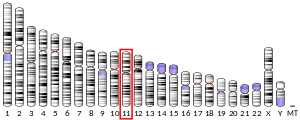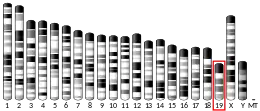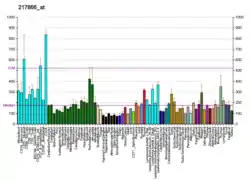| CPSF7 | |||||||||||||||||||||||||||||||||||||||||||||||||||
|---|---|---|---|---|---|---|---|---|---|---|---|---|---|---|---|---|---|---|---|---|---|---|---|---|---|---|---|---|---|---|---|---|---|---|---|---|---|---|---|---|---|---|---|---|---|---|---|---|---|---|---|
| |||||||||||||||||||||||||||||||||||||||||||||||||||
| Identifiers | |||||||||||||||||||||||||||||||||||||||||||||||||||
| Aliases | CPSF7, CFIm59, FLJ12529, cleavage and polyadenylation specific factor 7 | ||||||||||||||||||||||||||||||||||||||||||||||||||
| External IDs | MGI: 1917826 HomoloGene: 11731 GeneCards: CPSF7 | ||||||||||||||||||||||||||||||||||||||||||||||||||
| |||||||||||||||||||||||||||||||||||||||||||||||||||
| |||||||||||||||||||||||||||||||||||||||||||||||||||
| |||||||||||||||||||||||||||||||||||||||||||||||||||
| |||||||||||||||||||||||||||||||||||||||||||||||||||
| |||||||||||||||||||||||||||||||||||||||||||||||||||
| Wikidata | |||||||||||||||||||||||||||||||||||||||||||||||||||
| |||||||||||||||||||||||||||||||||||||||||||||||||||
Cleavage and polyadenylation specificity factor subunit 7 is a protein that in humans is encoded by the CPSF7 gene.[5][6]
Function
CPSF7, also known as CFIm59, is the cleavage factor of two closely associated protein complexes in the 3' untranslated region of a newly synthesized pre-messenger RNA (mRNA) molecule used in gene transcription. [7] CPSF7 is one of three Cleavage and polyadenylation specificity factors (CPSF), the other two being CFIm25 (or CPSF5/NUDT21) and CFIm68 (or CPSF6).
References
- 1 2 3 GRCh38: Ensembl release 89: ENSG00000149532 - Ensembl, May 2017
- 1 2 3 GRCm38: Ensembl release 89: ENSMUSG00000034820 - Ensembl, May 2017
- ↑ "Human PubMed Reference:". National Center for Biotechnology Information, U.S. National Library of Medicine.
- ↑ "Mouse PubMed Reference:". National Center for Biotechnology Information, U.S. National Library of Medicine.
- ↑ Strausberg RL, Feingold EA, Grouse LH, Derge JG, Klausner RD, Collins FS, et al. (December 2002). "Generation and initial analysis of more than 15,000 full-length human and mouse cDNA sequences". Proceedings of the National Academy of Sciences of the United States of America. 99 (26): 16899–903. Bibcode:2002PNAS...9916899M. doi:10.1073/pnas.242603899. PMC 139241. PMID 12477932.
- ↑ "Entrez Gene: FLJ12529 pre-mRNA cleavage factor I, 59 kDa subunit".
- ↑ Hardy JG, Norbury CJ (August 2016). "Cleavage factor Im (CFIm) as a regulator of alternative polyadenylation". Biochemical Society Transactions. 44 (4): 1051–7. doi:10.1042/BST20160078. PMID 27528751. S2CID 206156045.
Further reading
- Olsen JV, Blagoev B, Gnad F, Macek B, Kumar C, Mortensen P, Mann M (November 2006). "Global, in vivo, and site-specific phosphorylation dynamics in signaling networks". Cell. 127 (3): 635–48. doi:10.1016/j.cell.2006.09.026. PMID 17081983. S2CID 7827573.
- Lim J, Hao T, Shaw C, Patel AJ, Szabó G, Rual JF, Fisk CJ, Li N, Smolyar A, Hill DE, Barabási AL, Vidal M, Zoghbi HY (May 2006). "A protein-protein interaction network for human inherited ataxias and disorders of Purkinje cell degeneration". Cell. 125 (4): 801–14. doi:10.1016/j.cell.2006.03.032. PMID 16713569. S2CID 13709685.
- Brill LM, Salomon AR, Ficarro SB, Mukherji M, Stettler-Gill M, Peters EC (May 2004). "Robust phosphoproteomic profiling of tyrosine phosphorylation sites from human T cells using immobilized metal affinity chromatography and tandem mass spectrometry". Analytical Chemistry. 76 (10): 2763–72. doi:10.1021/ac035352d. PMID 15144186.
- Rüegsegger U, Beyer K, Keller W (March 1996). "Purification and characterization of human cleavage factor Im involved in the 3' end processing of messenger RNA precursors". The Journal of Biological Chemistry. 271 (11): 6107–13. doi:10.1074/jbc.271.11.6107. PMID 8626397.
This article is issued from Wikipedia. The text is licensed under Creative Commons - Attribution - Sharealike. Additional terms may apply for the media files.




